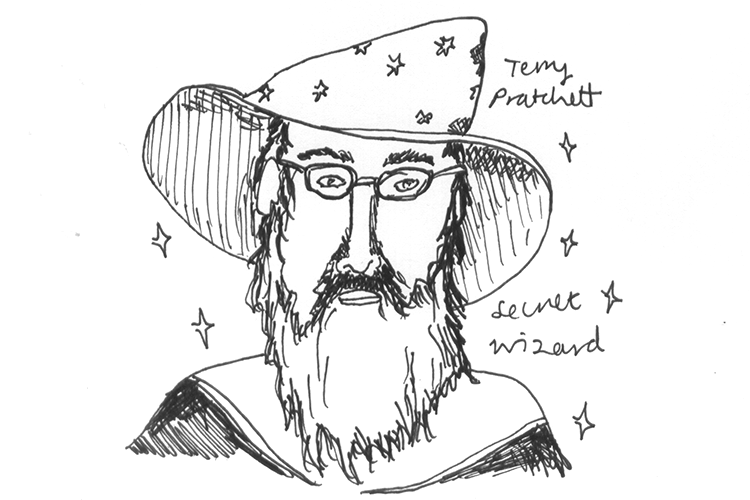Words by Morgan Goodman
Eight or nine years ago, I came across a worn copy of Night Watch by Terry Pratchett, in a small town library somewhere in WA. It slipped its way past the first few blockades of my early adolescent tastes by ostensibly being a story about time travel, and in that respect I was probably disappointed; it lacked the Doctor Who-ish, Heinleinesque paradoxical hijinkery I had been looking for.
Instead, what I got was a sort of essay on sensible humanism wrapped in fantasy tropes to make it go down easy. It was a character study of a misanthrope and the city he protected so doggedly, and it was, at times, very grim but very heartfelt. And, it was funny— funny in a way nothing I had read before had been. Night Watch was not the best introduction to the (bythatpoint) cosmically vast Discworld series, heavy with its established characters and continuing story threads; but I was captivated all the same. I finished it the same day and spent the next year ordering every scrap of Pratchett’s work I could find through local libraries — my favourites being the audiobooks read by Nigel Planer, which I listened to so often I could recite them, ridiculous accents included.
Comparisons are always made between Sir Terry’s style and that of Douglas Adams, author of that other single greatest series on Earth, and superficially, they’re appropriate. Both were happy enough to ignore conventions of viewpoint and even relevance to the story if they thought it would be funny, and both were making fun of the strangely restrictive and apparently arbitrary mindsets of their fellow humans. Both also delighted in silly names— but in Pratchett’s work, the characters attached to those names were people, not just punchlines. The lessons delivered as part of some satirical comment on the real world led to growth and change in his characters and his universe, and that gave them an emotional punch that Adams’ writing never fully had. Even in the silliest settings, like the Egypt-analogue Djelibeybi (which took me a few days to get as a teenager, sadly) or in stories that start as outright parodies of, say, Shakespeare, or of the sword and sandal fantasy of Robert E. Howard, by the end of the book there was always a legitimate sense of payoff. In a way, Pratchett was creating the world that he thought should exist by placing problems in his sandbox, and then approaching them with the cynical humanism that marked everything he wrote.
This attitude to fiction is most obvious in the development of Ankh-Morpork. The city was first introduced in The Colour of Magic as a Dungeons and Dragons-style wretched hive of criminals and self-interested denizens, with a river so polluted you couldn’t drown in it, only suffocate. When we returned to the city in following novels, it wasn’t that the criminals had disappeared, the citizens had become a more civic-minded, or the river Ankh less polluted. This state was part of its fundamental nature and was fertile ground for a great deal of humour. Over the course of the entire Discworld series though, it underwent a number of social and industrial revolutions as Pratchett determined to skewer this or that aspect of modern life – tabloid journalism, or religious extremism. The cumulative effect was to create a fantasy icon that felt like a real city. Every time a new novel returned to Ankh-Morpork these elements had been incorporated into its black, rotten heart— and it was a better place for it.
If Ankh-Morpork represented the world as Pratchett wanted to see it, then Samuel Vimes and Granny Weatherwax are the characters that epitomise the worldview that informed his writing. Both are deeply cynical, misanthropic and intolerant; both are deeply flawed and at times quite stupid, but both are also devoted to upholding a code of ethics and fighting injustice, with an almost Kantian desire to do Right, despite any personal misgivings. Pratchett was always keen to point out the fallibility of his heroes— whether parodically or seriously— and the most severe flaw anyone could suffer under his pen was to be stupid. More often than not, his villains were driven by their own wilful stupidity and desire to resist sensible reform. On the flip side, his heroes were defined more by their attitude and outlook than superpowers or destiny. Sure, more classical action-fantasy protagonists exist on the Disc, but they are regarded with the cautious derision that one might accord especially stupid narcissists and sociopaths. What Terry Pratchett fought against was every kind of exceptionalism in his writing— arguing that all anyone really needs to make the world that little bit better is a healthy amount of cynicism, some common sense, and a desire to do some good, somewhere. For that thoroughly sensible moral education, I am grateful to him, and will miss him a great deal.

